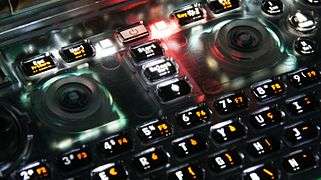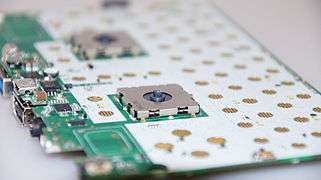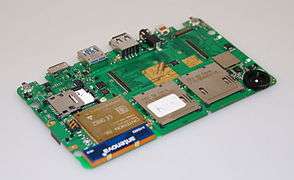DragonBox Pyra
 | |
|
Rendering of a red Pyra | |
| Manufacturer | OpenPandora GmbH |
|---|---|
| Type | Handheld game console / UMPC / PDA hybrid |
| Operating system | Debian |
| System-on-chip used | Texas Instruments OMAP5432 |
| CPU | 1.5 GHz dual-core ARM Cortex-A15 with NEON SIMD |
| Memory | 2 GB (4 GB option) |
| Storage | Dual SDXC slots, one internal microSD slot |
| Display | 5" LCD resistive display, 720p |
| Graphics | 533 MHz PowerVR SGX544MP2 |
| Controller input | D-pad |
| Connectivity | Wi-Fi, Bluetooth, USB (all port sizes), MicroHDMI, headset port and 3G/4G/UMTS/GPS (optional) |
| Dimensions | 139 mm x 87 mm x 32 mm |
| Predecessor | OpenPandora |
| Website |
pyra-handheld |
The DragonBox Pyra is an upcoming Linux-based handheld computer equipped with a keyboard and gaming controls. The project entered prototyping stage in 2015. Pre-orders began on 1 May 2016, with a final release date open.[1]
History

The Dragonbox Pyra is the spiritual successor of the OpenPandora device, and shares some of the original Pandora team members. The Pyra is designed and developed in close connection with the OpenPandora community, taking their feedback and experience with the Pandora into account. The OpenPandora GmbH, residing in Germany, organizes design, prototyping and the production in Europe (Greece and Germany).
The Pyra was presented officially at the FOSDEM 2014 in Brussels.[2] In 2015 several working developer prototypes of the Pyra have been produced and were given to software developers for evaluation and software creation. Development and fine tuning of the final specifications is still ongoing.[3][4] Preorder of six Pyra variants (4 GB RAM and 3/4G mobile options) became possible on 1 May 2016.
Architecture

Like the predecessor OpenPandora, the Pyra includes features from several architectures making it a cross between a handheld game console, a subnotebook, a PDA, and a smartphone.
The Pyra design aims for modularity and openness in software as hardware alike. For instance the PCB is separated in three parts: CPU board (CPU, RAM and storage), mainboard (ports, Wi-Fi and Bluetooth) and the display board. The replaceable CPU board allows future upgrades of CPU and RAM. The Pyra is assembled with screws (not glued) and is therefore repair and modification friendly.
It was announced that the hardware schematics will be available (final license undecided), which make the Pyra a kind of Open source hardware.[5] For compliance with the Free Software Foundation's "Respects Your Freedom" certificate the closed source SGX GPU driver was identified as the only remaining software roadblock ("would be good to have free drivers, but we can't achieve this for the GPU" but the device may or may not run without a 3D driver, possibly free 2D driver is available or either could be made).[6] The certification is not only about bundled software, using proprietary software, or recommending it, such as non-free [emulated] games, but also about naming, e.g. Linux vs. GNU/Linux. In November 2016 a pre-release version of the Pyra schematics was made available under a CC BY-NC-SA license.[7]
Software
The operating system will be based on the common open source Linux distribution Debian which allows the use of already available desktop open source applications from the Debian repository, for instance Firefox, Thunderbird, LibreOffice, GIMP etc. The around 1,500 applications, created for the mostly open source OpenPandora software ecosystem,[8] are expected to be available for the Pyra in short time by source ports.
Technical specifications
The various model specifications are summarized as follows:
| Specification | Base model | Mobile model |
|---|---|---|
| Dimensions | 139 mm x 87 mm x 32 mm | |
| SoC | Texas Instruments OMAP5432 (1.5 GHz dual-core ARM Cortex-A15 with 533 MHz PowerVR SGX544MP2) | |
| Screen | 5-inch LCD resistive display, 720p, 20 ms response time | |
| Audio | High-quality speakers, analogue volume wheel, 3.5 mm headphone jack, built-in-mic | |
| Haptic feedback | Force feedback vibramotor | |
| Keyboard | Four-row backlit QWERTY keyboard | |
| Game controls | D-pad, 6 face action buttons, 4 shoulder buttons, 2 clickable analog nubs | |
| Ports | Dual SDXC full size slots + one microSD slot underneath the battery Micro-USB 3.0 on-the-go (OTG) port Full-size USB 2.0 host port Full-size USB 3.0 host port (only 2.0 speed until a CPU upgrade) with optional eSATA adapter (full SATA speed) HDMI output through Type D (micro) port | |
| Battery | User-replaceable battery with 6000 mAh capacity | |
| LEDs | Fully configurable RGB LEDs for notifications | |
| Connectivity | Wi-Fi, Bluetooth 4.1 | 3G/4G module including GPS, a 6-axis digital compass, a pressure, humidity and gas sensor, Wi-Fi, Bluetooth 4.1 |
Gallery
 Pyra prototype with Debian, running a terminal, GIMP, and LibreOffice
Pyra prototype with Debian, running a terminal, GIMP, and LibreOffice Pyra prototype size comparison with MicroSD
Pyra prototype size comparison with MicroSD Pyra prototype with backlit keyboard and controls
Pyra prototype with backlit keyboard and controls Pyra prototype backside with battery
Pyra prototype backside with battery Pyra prototype mainboard frontside with nubs
Pyra prototype mainboard frontside with nubs Pyra prototype mainboard backside without CPU mezzanine board
Pyra prototype mainboard backside without CPU mezzanine board- Pyra prototype CPU mezzanine board
 Back of a red variant with ports (rendered)
Back of a red variant with ports (rendered)
See also
External links
| Wikimedia Commons has media related to Pyra (console). |
References
- ↑ dragonbox-pyra-now-available-preorder on The Verge (2 May 2016)
- ↑ Pandoralive post about the FOSDEM news
- ↑ DragonBox Pyra pre-orders begin (open Source handheld gaming PC) on liliputing.com (05/01/2016)
- ↑ DragonBox Pyra : les news on open-consoles-news.com (2015)
- ↑ Pyra on pyra-handheld.com "Full schematics will be available: You could. i.e. design your own custom mainboard and use Pyras CPU board to run it." (1 May 2016)
- ↑ respects-your-freedom-certification on pyra-handheld.com
- ↑ Michael Mrozek (2016-11-20). "Power, Memory and Schematics". pyra-handheld.com by.
As promised, the Pyra will be more open than the Pandora and Nikolaus had some time to clean up the schematics! Attached to this post are the schematics for the current revision (5.1.3) of the Pyra. Unless a bug is found, these won't change anymore.[...] License is CC-BY-NC-SA
- ↑ repo.openpandora.org "Apps: 1583, Dl's: 1225287" (6 May 2016)

